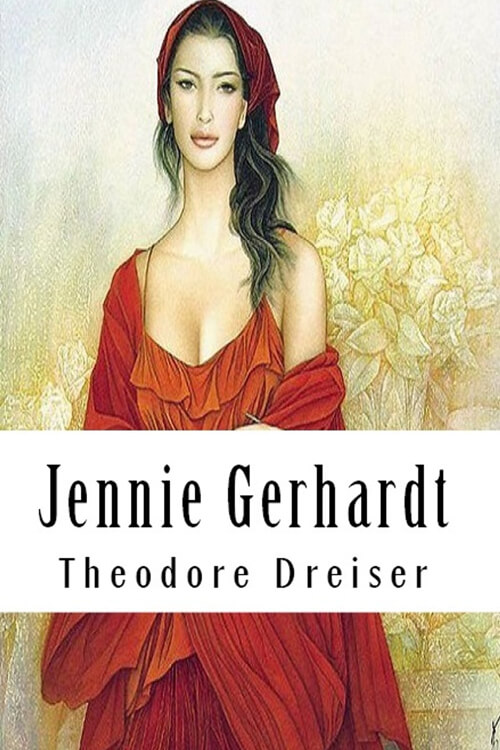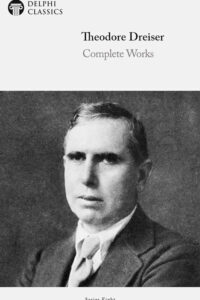
Jennie Gerhardt, A Novel
One morning, in the fall of 1880, a middle-aged woman, accompanied by a young girl of eighteen, presented herself at the clerk’s desk of the principal hotel in Columbus, Ohio, and inquired as to whether there was anything about the place that she could do. She was of a helpless, fleshy build, with a frank, open countenance and an innocent, diffident manner. Her eyes were large and patient, and in them dwelt such a shadow of distress as only those who have looked sympathetically into the countenances of the distraught and helpless poor know anything about. Anyone could see where the daughter behind her got the timidity and shamefacedness that now caused her to stand back and look indifferently away. She was a product of the fancy, the feeling, the innate affection of the untutored but poetic mind of her mother combined with the gravity and poise that were characteristic of her father. Poverty was driving them. Together they presented so appealing a picture of honest necessity that even the clerk was affected.
“What is it you would like to do?” he said.
“Maybe you have some cleaning or scrubbing,” she replied, timidly. “I could wash the floors.”
The daughter, hearing the statement, turned uneasily, not because it irritated her to work, but because she hated people to guess at the poverty that made it necessary. The clerk, manlike, was affected by the evidence of beauty in distress. The innocent helplessness of the daughter made their lot seem hard indeed.
“Wait a moment,” he said; and, stepping into a back office, he called the head housekeeper.
There was work to be done. The main staircase and parlor hall were unswept because of the absence of the regular scrub-woman.
Read or download Book
Theodore Dreiser
Theodore Herman Albert Dreiser (August 27, 1871 – December 28, 1945) was an American novelist and journalist of the naturalist school.
Biography.
His novels often featured main characters who succeeded at their objectives despite a lack of a firm moral code, and literary situations that more closely resemble studies of nature than tales of choice and agency. Dreiser’s best-known novels include Sister Carrie (1900) and An American Tragedy (1925). In 1892, Dreiser started work as a reporter and drama critic for newspapers in Chicago, Saint Louis, Toledo, Pittsburgh, and New York. During this period he published his first work of fiction, The Return of Genius, which appeared in the Chicago Daily Globe under the name Carl Dreiser.
By 1895 he was writing articles for magazines. He authored articles on writers such as Nathaniel Hawthorne, William Dean Howells, Israel Zangwill, and John Burroughs and interviewed public figures such as Andrew Carnegie, Marshall Field, Thomas Edison, and Theodore Thomas. His other interviewees included Lillian Nordica, Emilia E. Barr, Philip Armour, and Alfred Stieglitz. In 1895, Dreiser convinced business associates of his songwriter brother Paul to give him the editorship of a magazine called Ev’ry Month, in which he published his first story, “Forgotten” a tale based on a song of his brother’s titled “The Letter That Never Came”. Dreiser continued editing magazines, becoming editor of the women’s magazine The Delineator in June 1907.
As Daniels noted, he thereby began to achieve financial independence. Dreiser claimed to have collected such stories every year between 1895 and 1935. He based his novel on details and the setting of the 1906 murder of Grace Brown by Chester Gillette in upstate New York, a crime that attracted widespread attention from newspapers. While the novel sold well, it also was criticized for its portrayal of a man without morals who commits a sordid murder. Though known primarily as a novelist, Dreiser also wrote short stories, publishing his first collection of 11, entitled, Free and Other Stories in 1918. His story “My Brother Paul” was a biography of his older brother Paul Dresser, who became a famous songwriter in the 1890s. This story formed the basis for the 1942 romantic movie My Gal Sal. Dreiser also wrote poetry. His poem “The Aspirant” (1929) continues his theme of poverty and ambition: a young man in a shabbily furnished room describes his own and the other tenants’ dreams, and asks “Why? Why?” The poem appeared in The Poetry Quartos, collected and printed by Paul Johnston, and published by Random House in 1929.






